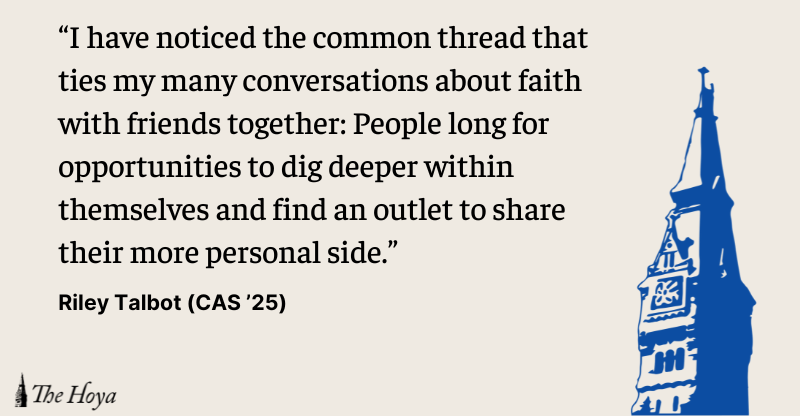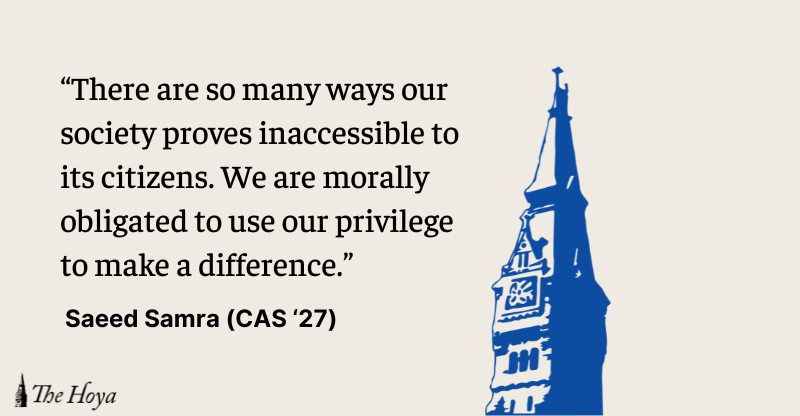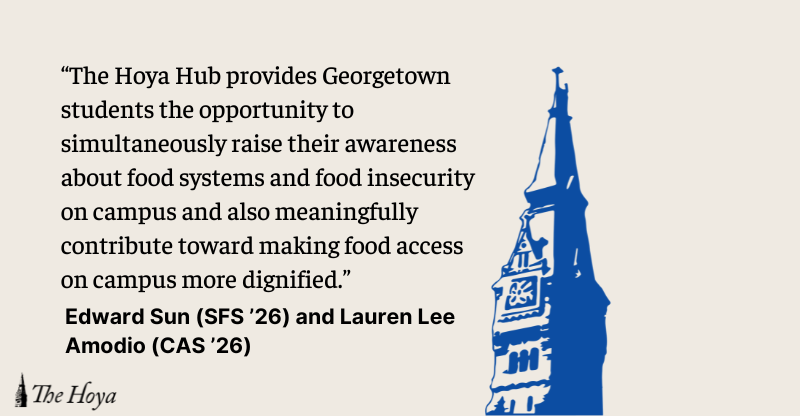“Did you grow up religious?”
“Do you identify with a particular faith tradition?”
“How do you pray?”
These questions are not common in upstairs Leo’s where students typically discuss their classes, love lives and weekend plans over Olive Branch. Yet, as a practicing Catholic and theology major, I do not shy away from these questions. They have sparked some of my most memorable and edifying conversations at Georgetown University — even in noisy, unsophisticated Leo’s.
Studying theology and government in one of the most political cities in the country has shown me just how touchy conversations about faith and politics can be. I’ve noticed that in response to the delicate nature of these topics, conversations often remain vague and surface level so as to avoid offense or contention.
But I can’t help myself from digging deeper and asking the hard questions.
And I’ve learned that all it really takes is one person to be vulnerable and open about their faith to encourage others to feel comfortable doing the same. I encourage members of the Georgetown community to intentionally practice vulnerability by sharing the deeper side of what is going on in their lives, letting their friends know about what they are struggling with and being open about where they find joy. These conversations can deepen friendships and foster a more sincere sense of belonging within a community.
As someone who is proud of my faith, the leap into vulnerability is a first step I often take. I can attribute this openness to the formation Catholic Ministry has offered me, especially through Catholic retreats, Catholic Faith Communities and Spiritual Discussion Dinners hosted by Catholic Women at Georgetown, a student organization for faith formation and fellowship among Catholic women. These spaces are designed to develop vulnerability, and in them I have found ample opportunities to be more vulnerable about my life experiences than I can be in other contexts at Georgetown. Each time I am open in a faith space on campus, I have been met with an unwavering acceptance, which continues to encourage vulnerability and build community.
I have found myself using this firm foundation to extend the opportunity for vulnerability to other people in my life: my friends, my roommates, even my Rangila dance partners. My strong Catholic faith makes me excited to cultivate openness with my friends, no matter their religious affiliation — or lack thereof — because I know just how freeing and valuable those experiences can be.
I think the Jesuit Catholic identity at Georgetown encourages these conversations by providing a common language for, and an introduction to, faith conversations. Opportunities like “The Problem of God” theology course, Chaplain’s Tea — a time to chat with chaplains and practitioners from various faith traditions over yummy snacks — and campus-wide religious services are excellent entry points for all members of the community to get involved in these discussions. Georgetown’s culture is rooted in the Jesuit value of interreligious dialogue — it primes us to have respectful conversations about faith and ask questions to further our understanding.
I have had conversations about growing up religious, leaving faith behind, coming back to faith and exploring new faiths with many different friends. I am always happy when my friends ask me questions about my own faith. On Ash Wednesday, I got to have conversations about what the season of Lent means to me as a Catholic. From there, I was able to open into a deeper conversation about sacrifices and share my religious tradition with my friends.
I have noticed the common thread that ties my many conversations about faith with friends together: People long for opportunities to dig deeper within themselves and find an outlet to share their more personal side.
Through this deeper knowledge, I can better support my friends on their own faith journeys just as they encourage me in mine — whether it be by gently reminding me about my Lenten promises or encouraging me to go to Mass when I am tempted to watch TV with them instead.
These conversations can be scary to have, especially when others’ reactions are unpredictable, but the benefits and growth in community that come from it far outweigh the risks for me. When I am able to share that part of me beyond just my Catholic community, I become a freer, more authentic version of myself. So, this semester, I challenge you to open your vulnerable side to your friends. Take a leap of faith and have a conversation about what motivates you in life, what draws you to goodness and where you find love. I hope that you, just as I have, will learn more about yourself and those you surround yourself with while becoming a better friend and support system. Ultimately, we can all benefit from this vulnerability by receiving the gifts of freedom and community.
Riley Talbot is a junior in the College of Arts & Sciences.




















